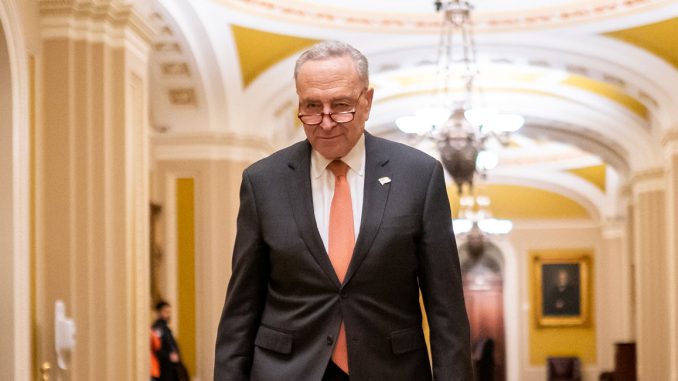
Back on May 30, 2023, after then-Speaker Kevin McCarthy cut a deal with President Joe Biden to suspend any limit on the federal debt through all of 2024, Senate Majority Leader Chuck Schumer praised the deal as an act of “responsible” government.
“Again, nobody got everything they wanted,” said Schumer, “but this bill is the responsible and prudent and necessary way forward.”
At the close of business on the day Schumer made this statement, the federal debt was $31,463,988,658,765.75.
At the close of business on April 8 of this year, the debt was $34,608,412,560,642.47.
In just over 10 months since Biden and McCarthy made their deal, the debt has increased by more than $3 trillion ($3,144,423,901,876.72).
To put this in perspective, the total federal debt did not top $3 trillion for the first time until fiscal year 1990—214 years after the nation was founded in 1776.
Schumer and his colleagues in the current Congress borrowed more money in less than one year than their pre-1990 predecessors did in more than two centuries.
What is the fiscally “responsible” Schumer talking about now? He is bragging about how he is spending federal money on pet projects in New York state.
In the seven days from April 2 through April 8, Schumer’s Senate office posted eight press releases announcing projects that would funnel $79,174,581 in federal funding to New York.
His communications staff was especially busy on April 2.
The first press release they put out that day said that Schumer and Sen. Kirsten Gillibrand, D-N.Y., had “secured $3,822,000 for critical local projects.”
“This nearly $4 million in federal funding makes vital investments in the Capital Region’s top-notch educational institutions, helping give students the equipment and hands-on training they need,” Schumer said.
The second press release they put out that day said Schumer and Gillibrand “secured $3,000,000 for the Syracuse University and CenterState CEO in the Fiscal Year 2024 appropriations bills to upgrade facilities at the Syracuse University’s South Side Innovation Center and prepare local small business to succeed in the semiconductor industry through CenterState CEO.”
The third press release they put out that day said Schumer and Gillibrand “personally secured $1,000,000 for Binghamton University to purchase state-of-the-art advanced packaging equipment for its Nanofabrication Laboratory (NLAB) in Fiscal Year 2024 appropriations bills as a Congressionally Directed Spending request to bolster workforce training for advanced chip manufacturing in cleanroom environments.”
A fourth press release they put out that day said Schumer and Gillibrand “secured $1,200,000 in the Fiscal Year 2024 appropriations package for DAY ONE Early Learning Community, a preschool in Poughkeepsie that serves low-income children and families.”
A fifth press release published that same day said Schumer and Gillibrand “announced $5,633,581 through the Environmental Protection Agency’s (EPA) Great Lakes Environmental Justice Grant Program to develop and implement the Western New York Environmental Justice Grant Program for underserved communities in Lake Erie and Niagara River’s watershed.”
Two days later, on April 4, Schumer “announced $1,559,000 from Fiscal Year 2024 appropriations bills to support vital semiconductor and healthcare workforce training programs and higher education infrastructure upgrades in Rochester.”
Four days after that, on April 8, Schumer declared that he was “proud to deliver a whopping $39 million to help rehabilitate the South Grand Island Bridges and bolster resilient infrastructure needed to maintain these vital corridors for Western NY.”
That same day, he also announced that a “whopping nearly $24 million from our Bipartisan Infrastructure & Jobs Law to bolster flooding mitigation on Cortlandt’s Route 6 will drive our communities towards a safer and more resilient future.”
Who is going to pay for these projects in Schumer’s home state?
Federal taxpayers in New York, of course, will carry some of the burden—but so, too, will taxpaying workers in Indiana, Kentucky, Tennessee, Kansas, Oklahoma, Idaho, Alaska, and every other state in the union.
Because the federal government is continuing to run a massive deficit—it was $828.135 billion through the first five months of this fiscal year—not only will current taxpayers fund such projects but so, too, will future generations who will be required to pay the interest on the money the federal government borrows to fund them.
COPYRIGHT 2024 CREATORS.COM
The Daily Signal publishes a variety of perspectives. Nothing written here is to be construed as representing the views of The Heritage Foundation.

